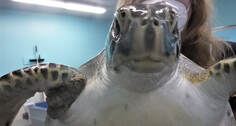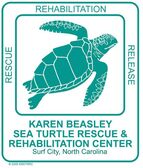 by Karen Sota Many of the cold-stunned patients we admitted over the winter are well on their way to getting their final release papers, along with a boat ride home. But we still have a few in our Sick Bay area that need some extra TLC. One of those is a little green named “Thistle.” Thistle stranded on Cape Lookout on January 18th with more problems than just being frosty. As a turtle starts to experience the effects of the cold their circulation decreases leaving them unable to move. Their flippers and head are especially vulnerable to all kinds of damage as they lie exposed and helpless. That includes predation. Thistle was on the thin side, we’ve seen much worse, but we don’t normally see a bite wound on a sea turtle that clearly came from a mammal. Based on the outline of the bite and some adjacent marks it appears that Thistle was almost a snack for a coyote. Her wound is on the underside of her right front flipper and is very deep, through muscle and down to the bone. The bite is serious, and her flipper is extremely fragile, but she somehow manages to use it quite well. Thistle was immediately put on the standard protocol of fluids and antibiotics, along with topical wound treatment consisting of lots of flushing with saline and diluted betadine after which she spends time resting comfortably on a fluffy towel while honey is applied to her wound and left to work its magic. Following a final flush, SSD is applied before she’s returned to her tank. After a few weeks with us it became apparent that the surrounding tissue was getting worse; the size of the wound was growing, possibly from bacteria foreign to a sea turtle. Fluids, antibiotics, and wound care has continued and now we’re finally seeing signs of healing. We want the dead scar tissue to slough off by itself without disturbing the muscle healing beneath it. Thistle is kept in extremely clean water, switched between tanks multiple times during the day and handled very gently. And barring anything out of the ordinary it looks like this little lady has beaten a wily coyote and will be going back home with all of her flippers. We’ve had a very busy few weeks since reopening for public tours. All time slots have been filled on Fridays and Saturdays but take heart. We’re adding another day – Sunday -beginning in April. Tour hours will be 11 AM – 1 PM on Fridays and Saturdays, and Noon – 2 PM on Sundays. Tickets must be purchased in advance through the reservations page on our website. Select the date, time and the number of guests in your party and purchase your tickets. We limit the number of guests for each time to make the experience more enjoyable and to continue our commitment to keep you and our staff safe as we work our way through Covid, and we are still requiring masks for everyone except children under 5 years of age – no exceptions. And just a reminder that you can come to the gift shop without going on the tour. Enter through the single door to the left of the main entrance. Even though we’re still on alert for late-arriving cold stuns it won’t be too much longer until those turtle mamas start heading toward shore. On Topsail our official start to nesting season is May 1st. If you spot anything unusual such as a stranding or nesting, please call our Director of Beach Operations, Terry Meyer at: 910-470-2880. If she is not available, you may call the hospital during operating hours: 910-329-0222. We will take the information and we will meet you to retrieve the turtle that will then be brought to us for follow-up. The State of NC hotline for stranded, sick, and injured turtles is 252-241-7367. The state number picks up 24/7. Please note that all our work with sea turtles, at the hospital and on the beach, is authorized by the NC Wildlife Resources Commission, ES Permit 22ST05.
0 Comments
Leave a Reply. |
Archives
February 2024
Categories |

|
Quick Links |
Visiting Hours
THE TURTLES WELCOME YOU!
CLICK HERE FOR INFORMATION. ADMISSION (PLUS sales tax & fees): $7.00 General Admission (Ages 13-61) $6.00 Military (Active Duty and Veterans) $6.00 Seniors (Ages 62 and up) $5.00 Children (Ages 3-12) $0.00 Babies and Toddlers (Ages 0-2) (Babies are free but a ticket is still required to save their spot!) |
We are a 501(c)(3) Non-Profit Organization - POWERED BY VOLUNTEERS
EIN: 56-1967579
This conservation work for protected sea turtles at the Karen Beasley Sea Turtle Rescue and Rehabilitation Center and on Topsail Island is authorized by the North Carolina Wildlife Resources Commission, ES Permit 24ST05.
©
2024 Karen Beasley Sea Turtle Rescue & Rehabilitation Center
Powered by Volunteers!
Website Design by Loggerhead Designs
Powered by Volunteers!
Website Design by Loggerhead Designs

 RSS Feed
RSS Feed